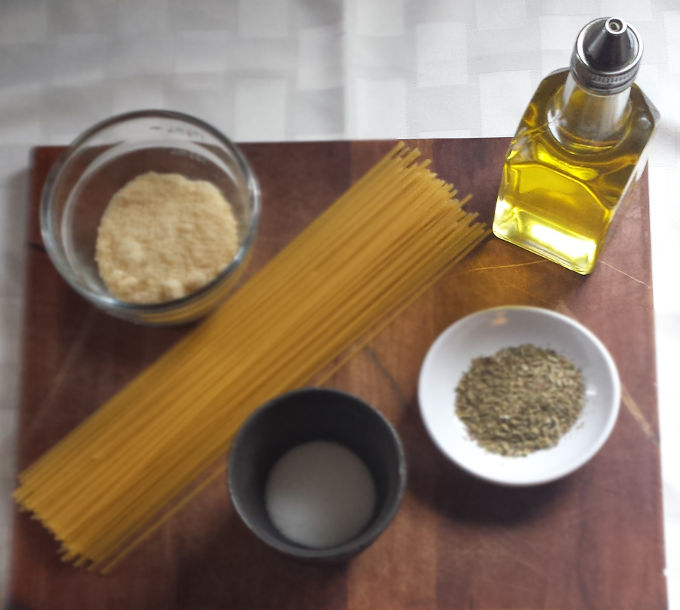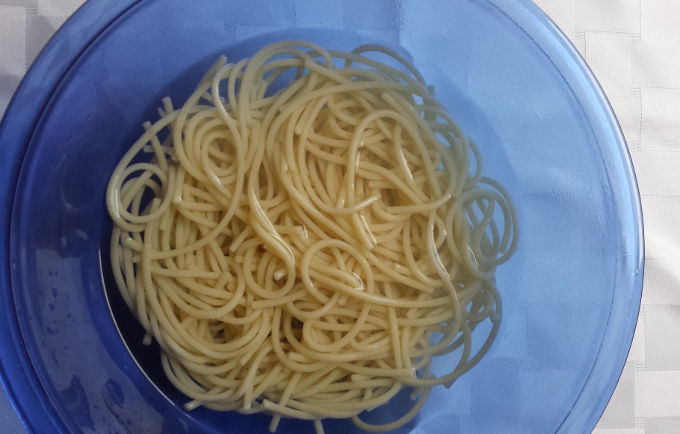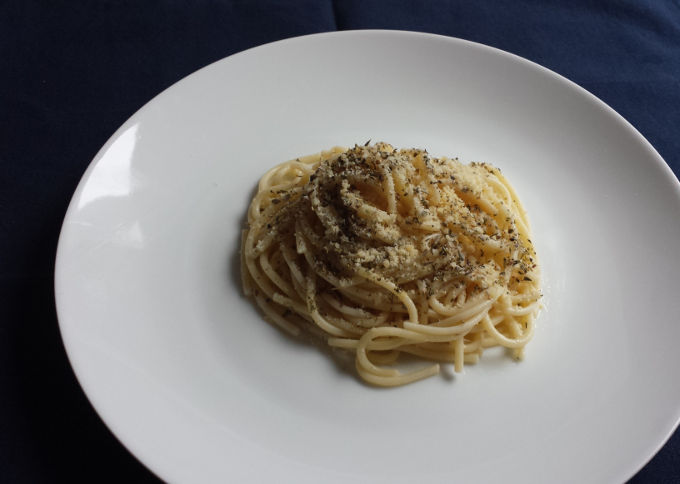Should Salt or Oil be Added When Cooking Pasta?
 A couple days ago my wife and I were watching a popular cooking show when one of the judges mentioned to a competitor that they hadn’t added any salt or oil to the water before boiling the pasta for a dish they were trying to make. Very politely the competitor said “I was taught not to do that.”
A couple days ago my wife and I were watching a popular cooking show when one of the judges mentioned to a competitor that they hadn’t added any salt or oil to the water before boiling the pasta for a dish they were trying to make. Very politely the competitor said “I was taught not to do that.”
And guess what…we had no argument for that.
My wife and I looked at each other and said “Hmm…That’s funny!” Both of us agreed with the competitor to a certain extent, and we felt that the judge had lost some credibility in our eyes. The problem is, that wasn’t the whole story. It just surprised us was all.
In all honesty, as my wife and I were growing up, that’s what we were taught as well. Now before I get into whether you should or should not add anything to the water before you begin cooking your pasta, keep in mind that there is no right or wrong way to cook it. I know this might be opening up a huge can of worms, because there are some people who will argue this point to the death (especially those who feel that their method is the authentic, and therefore correct way of doing things), but when it really comes down to it, you should cook your pasta the way you want. Period.
If you are on a low sodium diet, then naturally you won’t want to be adding any additional salt in with your noodles. Most people have been told that adding a bit of olive oil or some salt to the water will help keep the pasta from sticking when it is being cooked. While it’s true that adding a little oil in with the noodles can help them not stick to each other, the most important thing to remember is that simply giving them a good stir shortly after submerging them in the boiling water will keep them from sticking.
Here’s why. As soon as you drop the pasta into the boiling water, the granules of starch on the surface of the pasta instantly swell up and then pop. This allows the starch to escape and in turn makes the surface of the pasta quite sticky. At this point, they can literally cook together. If you take the time to stir the pasta from the beginning, then eventually, much of the surface starch will get dissolved in the water, which handily enough can be used later when you toss the pasta in the sauce. We will get to that important tip in just a little while though.
First, I want to say that there are definitely some advantages to using a generous amount of water when cooking your pasta. Obviously you won’t need as much if you only plan on cooking a small amount like say, 8oz or less, but I for one can’t cook for less than six people. Seriously, I don’t know what my problem is. More water means when you drop the pasta into the boiling water, it won’t take as long to come back to a boil. On top of that, there is more room for long noodles like spaghetti to cook properly, and it also reduces sticking somewhat by washing away the starch from the surface of the pasta.

If you plan on using olive oil
If you are set on adding oil to your water, there are a couple reasons to reconsider. While it is true that oil can help prevent sticking as well as preventing the water from boiling over the sides of the cooking pot, I don’t think it makes up for the fact that the noodles will become oily themselves, and unable to absorb any sauce. The sauce will simply slide off, leaving you with a bunch of flavorless pasta.
If you are having trouble with water wanting to boil over the sides, just turn the heat down a little. You can still maintain a nice boil this way. It will be a little bit less aggressive, but will do the job just fine, and it is a much better solution in my opinion than using oil.
With all that being said however, if you intend to make a simple sauce such as olive oil and Parmesan cheese, then it won’t really matte if you had added oil to the water prior to cooking the noodles. It would be a moot point since olive oil is going straight back on the noodles anyway.
Salt is the key
Before I even get started here, I need to clear something up. For some reason, there is this general idea floating around, that one of the reasons to add salt when boiling pasta is to raise the temperature of the water, which in turn allows the pasta to cook faster. While it is true that salt can raise the boiling point of water, we won’t be using enough salt to even begin to make a difference, and if we did, it would be so salty as to be inedible. Adding the amount of salt we require will only raise the temperature of the water by about 1° F. The real reason to add salt to the water is to give the pasta extra flavor, which means you might not need to add as much salt to the sauce itself. As Mario Batali once said, “It needs to taste like the ocean.”
Okay, I paraphrased that, and honestly since I live in Alaska, I don’t make it a habit of going around tasting the ocean. I’m guessing it’s not delicious though. But most people will eventually discover their own personal preference of how much salt they want to add to the water, and I encourage you to experiment and find out what works best for you. The spectrum ranges from a couple tablespoons of salt per 5 liters, to a couple palm fulls. It’s all up to you.
What I am basically saying, is that it’s not just about taking some store bought spaghetti noodles, boiling some water and then throwing the noodles in. Now let me just say that there is nothing wrong with that, if that’s what you like. But if you want to get more enjoyment out of the food you cook, I just have to say that there’s a lot more to cooking than dropping the macaroni noodles into some boiling water before adding the bag powdered American cheese and the vitamin D milk.
Fresh hot pasta absorbs more sauce
The goal of this overly long page is to make this point. If you are looking for an authentic recipe, or wondering whether or not you should add salt or oil to your water prior to adding the noodles, then this will sum it all up.
There is no need to add oil, it usually doesn’t help. In fact it often times does the opposite. Salt gives the noodles more flavor as it soaks in, allowing you to use less salt in whatever pasta sauce you decide to cook. So don’t feel bad about adding a generous amount of salt to the water prior to cooking your pasta. Most of it gets poured down the drain anyway. I personally really enjoy a pasta that is cooked just a little past al dente, and then taken directly from the boiling water and tossed into the sauce to finish cooking for just a few more minutes. The noodles absorb some of the pasta sauce (if you didn’t use any oil) making the noodles just that much more flavorful.
Don’t drain and rinse the pasta when it is done
Most people overcook their pasta, then throw the noodles in a strainer, and then run all kinds of cold water over the noodles. Most people don’t cook noodles well. To begin with, it stops the pasta from cooking anymore (which we want), and it washes away any sort of starch that the noodles might still be holding on to. Remember that little tip I mentioned about the starch from the noodles coming in handy? Well if you take the noodles straight from the water and add them directly to the sauce, they will still have starch on them. When the noodles are tossed with the pasta the starch will help thicken the sauce up. This combination of steps will help add a layer of depth as well as more flavor to your pasta dishes.
So there you have it. Salt is definitely the winner today. Wow all this writing about pasta is making me super hungry. I think I need to go whip up something delicious, and I think you should too.

